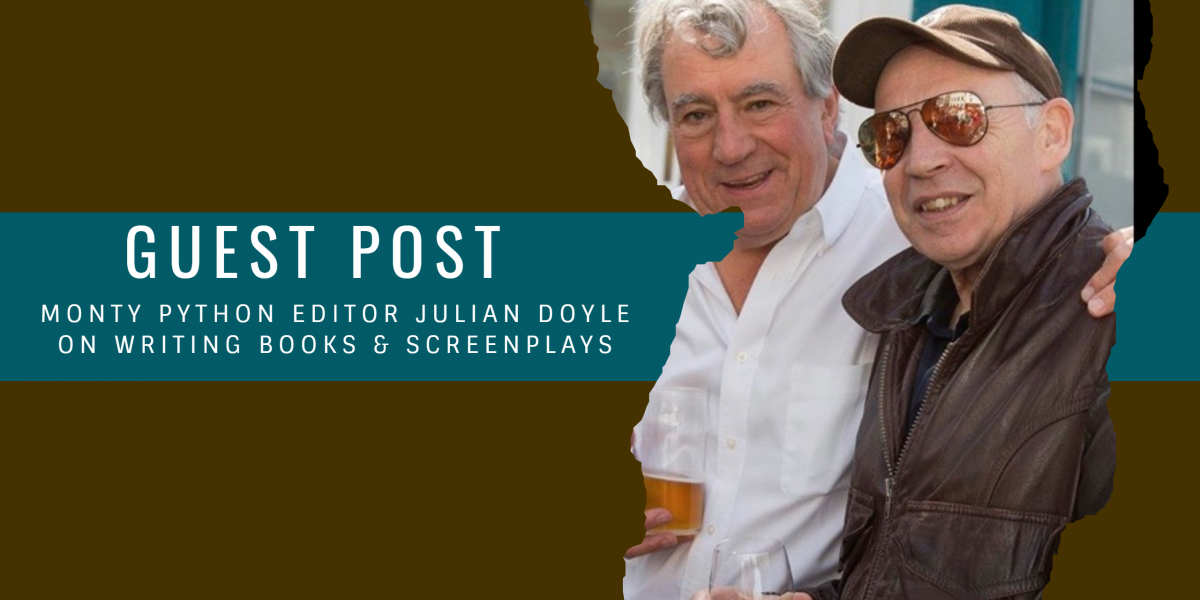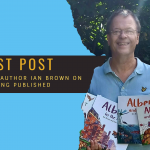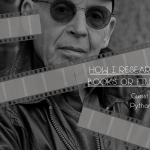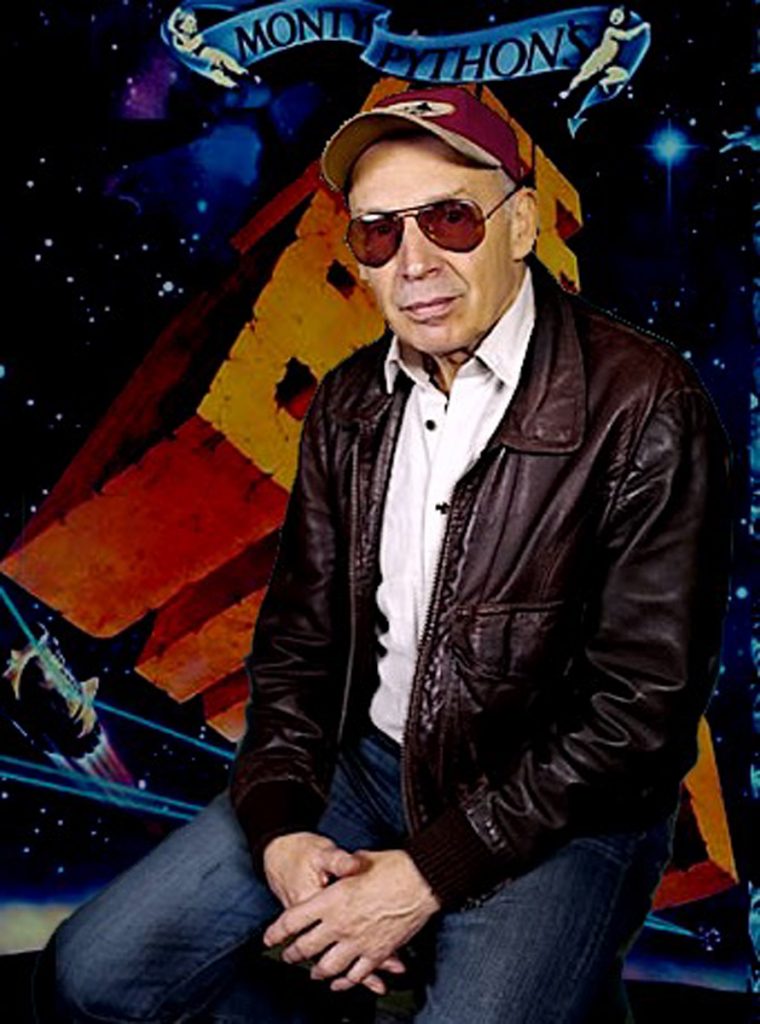
Julian Doyle’s Top 10 Tips About Writing Books or Screenplays
1. KNOW YOURSELF – As I sometimes work with a friend who is totally opposite to me, I realized why I work the way I do (which is very left brained). My friend is very right brained so this produces very different set of strengths and weaknesses, which you need to understand to counteract them. It is fascinating and has taught me a lot about myself.
2. STARTING – I usually have terrible trouble starting. I am overcritical about every idea I have. But if someone sends me a bad film script I can take it and make it good. I need that trigger of having something on the page. When I work with my writing partner, (‘Whispering’ Paul McDowell who was the lead singer of Temperance 7) we usually worked separately. He could fire off with no problem being right brained, in a stream of consciousness, or would it be better to say unconsciousness (as I think he smoked a joint before he sat down.) He emails me his first chapters and then I could join in the fun (we generally wrote comedies together.) We are both extremes of our type, most people would fall somewhere between leaning more to the left or right.
3. ENDINGS – I do like to know the ending before I start it gives me a clear direction where I am going. Endings are most important in film scripts. I lived with a drug addict and wrote a film ‘Love Potion’ in which I wanted to explain much of the process and the difficulties of getting off. The whole film revolved around the ending which one critic called Hitchcokian. Some compliment.
4. THE SLOG – When I am working on my own I have to just start writing and it is usually rubbish and then I can go back and start working on it. Paul writes the finished article as a stream of consciousness, but he cant go back to improve it. (It’s like a spider can weave its wonderful web, but if you brake it, the spider cannot repair the broken section. The spider’s DNA has the formula for the whole thing). But for me the process is very slow as I work it into shape over and over and over ad nauseam.
5. CHARACTERS – Most difficult for me is breathing life into the characters. Of course in film scripts this is less of a problem. I remember reading the film script for Terry Gilliam’s film ‘Brazil’ and saying to him that the mother and her friend sound the same. He answered, “Don’t worry when I cast different actors they will be different.”

“Julian Doyle is a hero and saved our collective asses more than anyone I know. He did it from love and kindness and is a true and wonderful human being…” – Eric Idle
“Julian’s done practically everything, from Kate Bush videos to Time Bandits and Brazil.” – Terry Jones (pictured left with Julian).
“I think Julian’s a great plus for many reasons, one of which is his experience and undoubted commitment.” – Michael Palin
6. DIFFERENT VOICES – I learnt a lot from Paul, he would tell me he knew this guy who always did something…. And then he already knew the person he was writing. He also wrote each character using different words. The banker “I’m going to leave this town tomorrow” or the blacksmith “I’m going to quit this town tomorrow.” Part of the secret is that different characters use different vocabulary. Most bad writing has everybody speaking in the same voice – the writer’s.
7. LANGUAGE – I love it when you can get a character who speaks in an exaggerated way. Paul was fabulous at it. I had a scene where I cast the actor but felt my writing was a bit dull. I passed it to Paul and he sent back a wonderful piece. I sent it to the actor, Tom Butcher, who rang me immediately. “I cant say all this flowery stuff, I didn’t agree to do this.” I told him to come in and I would go over it with him. We sat down and I played his part, which was a young arrogant well-educated pop group manager. We started but after just a minute he stopped me “I get it now” he said smiling and did it amazingly on the shoot. The set up was this manager, Miles, talking to young guy, Bradley who he has been using to follow some ticket touts. Here is some of the dialogue:
MILES – Now what was the figure we agreed on? 250?
BRADLEY – We didn’t exactly say, but 250 will do just fine.
MILES – (Hands over £50 notes) I should count them my maths is appalling.
Would you like a glass of water to celebrate? It’s very good. Been blessed by a Shinto priest.
BRADLEY – No thanks.
MILES – Mmmm. You’re probably right. He was a Californian Shinto priest. Not the same at all. Well then….I think an expensive law-suit is out of the question. I could pay a thousand on a couple of heavies to visit Mr Adams. Break a bone or two. Evacuate their bowls over his soft furnishings. What do you think Bradley? Heavies?
BRADLEY – I… would…
MILES – Right again Bradley. What a remarkably sensitive fellow you are.
You see the actor, Tom, was a regular on the cops show, ‘The Bill’, where the dialogue was very simple so he had never been faced with dialogue like this. But boy, once he got it he was great.
6. DEALING with CRITICISM – I like people to read my stuff before I put it out. But you have to learn to understand where they are coming from and assess if their comments are valid. I remember running Terry Gilliam’s film Brazil to friends. After the viewing we both went round asking them for comments. Of course they start with “It was Great”. They were being polite, so I say “We think there are a few boring bits and it’s too long. With that they fired off with loads of criticism. What they needed was permission to attack. After, Terry and I met to compare notes. Terry said everybody thought it was great! He had just not given them an opening to criticise. In my film Chemical Wedding about the outrageous occultist Aliester Crowley, my producer objected to some of the dialogue in the script (flowery language again). A couple of young students visit Crowley, one a believer and the other a sceptic science student. Crowley looks at him deeply and attacks. “You’re no scientist! You ooze disbelief. A good ritualized fuck would expand your consciousness not to mention your restricted orifices.”
My producer was horrified, “People don’t speak like that.” Crowley was at Oxford and a poet, and the inventor of sexual magic, which gave me the chance to use some great language. Of course that fine actor John Shrapnel loved it and milked it for all its worth. So how to take criticism is important. You have to be open to it but be clear in your head whether it is valid or not.
Here is the film but have a large scotch before you watch – like Crowley it is outrageous.
6. THE INTERNET – Many of my subjects are real people so the internet is an amazing tool at hand. I had hundreds of books that I would have to check references. Now at the click of a mouse it is all there.
7. CUT and PASTE – As I mentioned, I struggle at the beginning writing rubbish before refining it and moving sections about. In the old days I worked on a typewriter and I would cut with scissors sections I liked and actually paste them in a new order on to a page. There were days when my floor was covered in snippets and I tip toed between them seeking the next bit.
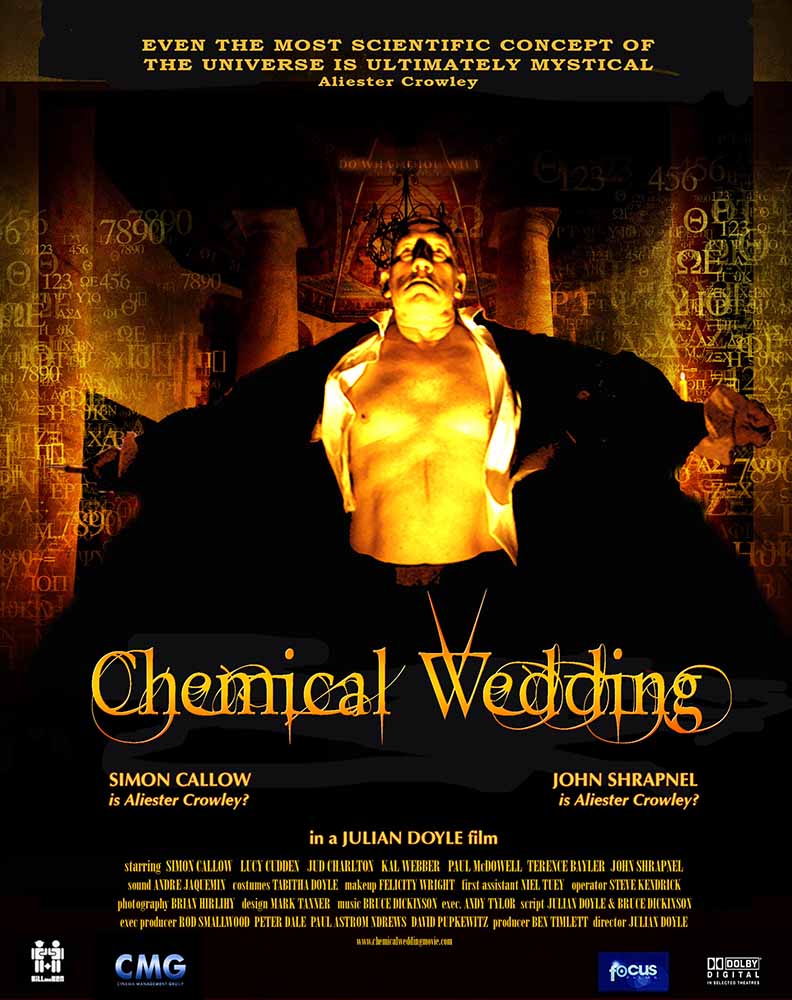
“A good ritualized fuck would expand your consciousness not to mention your restricted orifices.” – Julian Doyle (Chemical Wedding)
8. TIME– I think you need to understand your own body clock. You may be a morning person or a night person. I am a morning person – I wake up ready to go. When I was editing Life of Brian, we were filming in Tunisia. My cutting room was in the hotel and I would get up at 5 am, come down in the dark and start working. The crew would come down for breakfast around 7.30 and I would join them. Then back to work till lunch at 2. By that time I had done 8 hours. I know I am no good after lunch so I take a siesta for an hour. (My mother was Spanish so it comes naturally). Around 4pm I would come back down and work till the crew came back to the hotel at 7.30pm. So I had worked eleven and a half hours of very concentrated work but felt totally fresh at the end of the day because it had all happened at the right time for my body. By the way I learned the difference between morning and night people, working with Terry Gilliam. As I am a morning person I wake up ready to go, full of optimism and then around lunch I begin to flag. Terry is a night person. He wakes up a pessimist, “Oh no, another day. How am I going to get through it?” As the day progresses he starts to think it is not so bad and by late afternoon he is buzzing. So I think you wake up an optimist, or you wake up a pessimist. –
Further details about Life of Brian can be found on the Julian Doyle website.
9. MAGIC MOMENTS– I had an almost mystical experience when I read a book about the tumultuous relationship between the Composer Richard Wagner and the Philosopher Friedrich Nietzsche. I sat down and using their own writings and reported dialogue I wrote a play. We put it on in Edinburgh and the Festival Review wrote ‘How anyone could write such an intelligent, seem-less script analyzing the complex ideas of the composer Richard Wagner and the philosopher Friedrich Nietzsche is beyond me.“ But the thing is it is beyond me too – I still don’t know how it came together, it just seemed to happen. Performing it was both scary and exciting as it has music section that synch with the dialogue. The ending was tremendous as it used the 2001 theme that Straus wrote for Nietzsche’s ‘Thus Sprake Zarathustra” while Nietzsche goes mad on stage. As most of the play takes place in the Turin Lunatic asylum where Nietzsche was taken, we were able to film it cheaply. An American Philosophy magazine wrote glowingly saying it was ‘Masterful’ and now it is used in US Universities as a teaching aid.
10. CONGRATULATIONS– Be your severest critic but don’t forget to enjoy and congratulate yourself when you feel you have done a good job. Sometimes your work will not be recognised, sometimes it will never even get out there. When we took the finished film Timebandits over to Hollywood to get a release. I ran it to all the studios. At Universal for instance I sat in this huge cinema with a few executives sitting down the front. Their phones would go off every now and then and they would just answer them out loud and the film even to me seemed to look a mess in those conditions. We decided with George Harrison, who had financed the film, to release it ourselves. We did a deal with a company called Avco Embassy who handled the mechanics. Their offices were on two floors, the executives upstairs and the workers on the ground floor. Terry Gilliam and I went to see the trailer they had prepared. Afterwards Terry asked “Where are the Timebandits?” There were no Timebandits (who were all dwarfs) in the whole trailer. The executives said with great authority that a film came out last year with ‘little people’ and it did no business. It became clear they had very little faith in the film as the studios had turned it down. We came downstairs and as we passed through, the workers kept stopping us saying “What a great film”. We then realised that when the executives in the studios watch the film they are not sitting thinking “Do I enjoy this film?” They are thinking will THEY enjoy it! The parents are killed in the end leaving the kid an orphan, nobody is going to like that ending. Sean Connery appears half way through and then disappears. There was a film with little people in last year that flopped so this will too. So they speak amazingly authoritatively about it and at first I believed them. Then the film came out and it was a massive success and I realised they know nothing more than anyone else and probably a lot less than the workers who just sat and watched the film as an audience. Sounding authoritive even if you are talking nonsense is exactly how you become an executive.
So enjoy your work when it is good. I remember finishing a script that I knew was great. The story finished with the song, ‘Come up and see me make me Smile’. I put the song on and danced around the room in joy. It was one of the happiest moments of my life. Of course the film has not been made. So what! Many artists die before their work is recognised. This script unfortunately will just disappear after I die, but what the hell that day will always bring a smile to my face. So if you do a nice piece of work congratulate yourself.
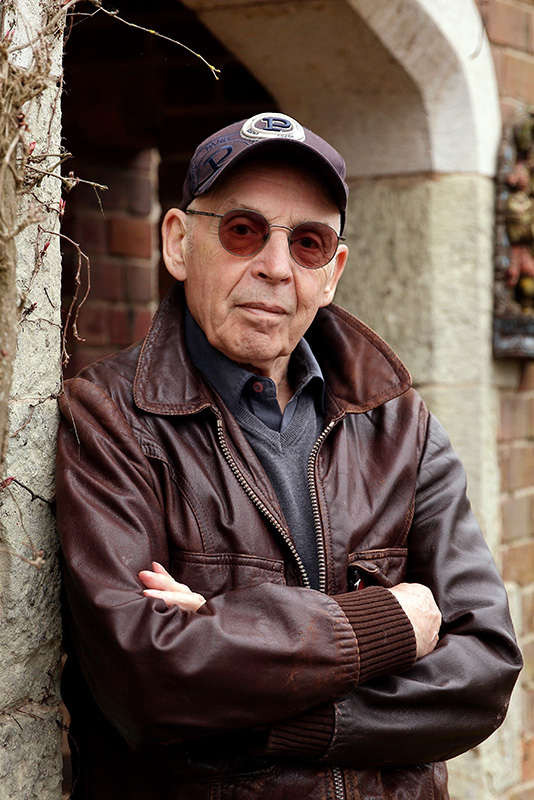
Filmmaker Julian Doyle has worked on some of the UK’s most cherished movies, including being a long-time collaborator on the films of Monty Python and Terry Gilliam. He has also written and directed a number of well-received films and music videos.
His books can all be found on Amazon.
For further information about Julian, his incredible legacy, and his books, visit JulianDoyle.info.


